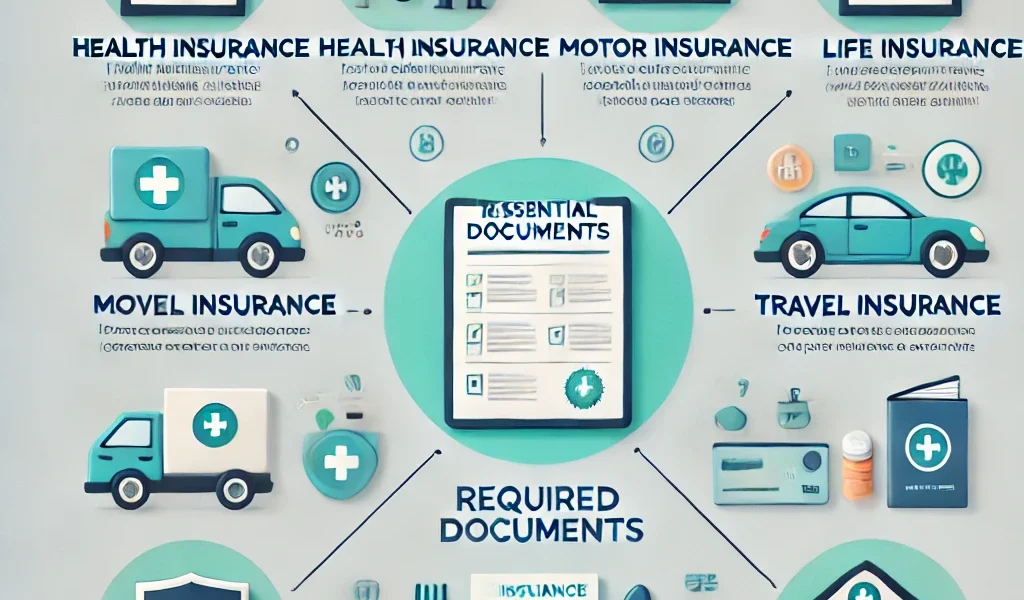Filing an insurance claim can be a daunting task, but having the right documents ready can make the process smooth and efficient. Whether it’s health, auto, home, life, or travel insurance, submitting the correct paperwork ensures that your claim is processed without unnecessary delays or rejections.
In this comprehensive guide, we will outline the essential documents required for different types of insurance claims and provide tips to ensure a hassle-free experience.
Factors That Affect Insurance Claim Documentation
Before diving into specific documents required for different insurance claims, it’s important to understand what factors impact the documentation process:
- Type of Insurance – Each insurance type has different claim requirements.
- Policy Terms and Conditions – Specific documents may be required based on policy coverage.
- Nature of the Claim – Accidental claims, natural disasters, and medical emergencies require different forms of documentation.
- Regulatory Requirements – Some claims must comply with legal guidelines before approval.
- Insurance Provider’s Policies – Different insurers may have varying documentation requirements.
Now, let’s explore the necessary documents for each type of insurance claim.
1. Health Insurance Claims
Documents Required:
- Duly Filled Claim Form – Provided by the insurer and signed by the claimant.
- Policy Copy – Proof of health insurance coverage.
- Medical Reports and Prescriptions – Diagnosis reports, treatment prescriptions, and doctor’s recommendations.
- Hospital Bills and Receipts – Itemized medical expenses.
- Discharge Summary – Provided by the hospital upon patient release.
- Investigation Reports – X-rays, MRI, CT scans, and other lab reports.
- Pharmacy Bills – Original medicine purchase receipts.
- KYC Documents (For Reimbursement Claims) – PAN card, Aadhar card, or passport.
Tips to Ensure a Smooth Claim Process:
- Opt for cashless claims at network hospitals to minimize paperwork.
- Always keep a copy of hospital bills and prescriptions.
- Submit the claim within the insurer’s stipulated timeframe.
2. Auto Insurance Claims
Documents Required:
- Claim Form – Filled and signed by the policyholder.
- Insurance Policy Copy – Proof of valid coverage.
- Driving License – Of the person driving at the time of the accident.
- Vehicle Registration Certificate (RC) – Ownership details of the insured vehicle.
- FIR or Police Report – Required for major accidents or third-party damages.
- Repair Bills and Estimate – Original invoice from the repair shop.
- Photographs of the Damaged Vehicle – For proof of accident impact.
- Witness Statements (If Any) – Useful in case of third-party claims.
Tips to Ensure a Smooth Claim Process:
- Report the accident immediately to your insurer.
- Take clear photographs of the accident site.
- File an FIR if third-party involvement exists.
3. Home Insurance Claims
Documents Required:
- Claim Form – Filled by the policyholder.
- Insurance Policy Copy – Proof of home insurance coverage.
- Property Ownership Documents – Title deed or lease agreement.
- Photographic Evidence – Pictures of damages caused by fire, flood, or theft.
- Police FIR (For Theft or Burglary Claims) – Necessary to validate theft claims.
- Repair Estimates & Bills – Cost of damage assessment and restoration.
- Fire Department Report (If Applicable) – For fire-related damages.
Tips to Ensure a Smooth Claim Process:
- File the claim as soon as possible after damage occurs.
- Keep receipts and invoices for valuable household items.
- Cooperate with the insurance surveyor for damage assessment.
4. Life Insurance Claims
Documents Required:
- Claim Form – Completed by the nominee/beneficiary.
- Original Policy Document – Proof of coverage and sum assured.
- Death Certificate – Issued by the municipal authority.
- Identity and Address Proof of Beneficiary – Aadhar card, passport, or PAN card.
- Medical Records of the Deceased – If death occurred due to illness.
- Postmortem Report (If Required) – In case of accidental or unnatural death.
- Police FIR (If Death Was Due to an Accident) – For verification and investigation.
- Bank Account Details of Nominee – For direct claim transfer.
Tips to Ensure a Smooth Claim Process:
- Ensure beneficiaries are aware of the policy details.
- Keep policy documents in a safe and accessible place.
- File the claim within the stipulated time period to avoid delays.
5. Travel Insurance Claims
Documents Required:
- Duly Filled Claim Form – With details of the incident.
- Travel Insurance Policy Copy – Proof of coverage.
- Flight Tickets and Boarding Pass – For claims related to flight delays or cancellations.
- Police Report (For Lost Baggage or Theft Claims) – Mandatory for stolen items.
- Hospital Bills and Medical Reports (For Medical Claims Abroad) – For reimbursement.
- Hotel and Travel Invoices – In case of trip cancellation claims.
- FIR (For Passport Loss Claims) – Required by authorities.
Tips to Ensure a Smooth Claim Process:
- Keep digital copies of important travel documents.
- Report any incidents immediately to local authorities.
- Contact the insurer as soon as the issue arises to avoid complications.
General Tips for a Hassle-Free Insurance Claim
Regardless of the type of insurance, the following best practices can help you get your claim settled faster:
- Read the Policy Terms Carefully: Understanding coverage details helps prevent surprises during claim submission.
- File Claims Promptly: Delay in filing may lead to rejection or extended processing times.
- Provide Complete and Accurate Information: Any misinformation or missing details can lead to claim denial.
- Keep Copies of All Documents: Maintain digital and physical copies for reference.
- Follow Up with the Insurer: Regularly check claim status to ensure timely processing.
- Seek Professional Assistance If Needed: An insurance agent or legal advisor can help if the claim process is complex.
Final Thoughts
Submitting the correct documents is crucial for a hassle-free insurance claim process. Being proactive, organized, and informed ensures that your claim is approved quickly without unnecessary hurdles.
This guide provides general information about the essential documents required for different insurance claims. However, policyholders should always check with their insurance providers for specific documentation requirements.
By following these guidelines, you can ensure a stress-free claim experience and receive the compensation you are entitled to without legal complications or disputes.



